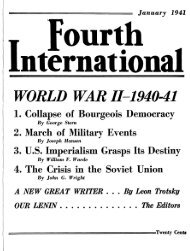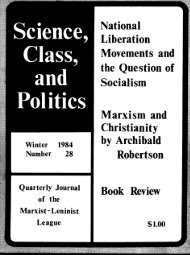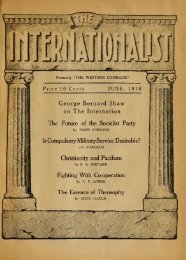The Stalin school of falsification - Marxists Internet Archive
The Stalin school of falsification - Marxists Internet Archive
The Stalin school of falsification - Marxists Internet Archive
You also want an ePaper? Increase the reach of your titles
YUMPU automatically turns print PDFs into web optimized ePapers that Google loves.
<strong>Stalin</strong> School <strong>of</strong> Falsification - Chapter 5<br />
accurately anticipated the Bolshevik dictatorship during the first three years <strong>of</strong> the October Revolution<br />
which, as is well known, arrived in a blind alley, tearing the proletariat away from the peasantry, by<br />
reason <strong>of</strong> which the Bolshevik party was compelled to make a long retreat."(Krasnaya Nov, No.2, 1923,<br />
p.262.)<br />
Before the N.E.P., "Trotskyism"reigned. Bolshevism began only with the New Economic Policy. It is<br />
noteworthy that Martinov reasoned in exactly the same way about the revolution <strong>of</strong> 1905!<br />
According to him, in October, November and December <strong>of</strong> 1905 — that is, in the period <strong>of</strong> the highest<br />
upsurge <strong>of</strong> the revolution — "Trotskyism" reigned. <strong>The</strong> real Marxian policy began only after the<br />
crushing <strong>of</strong> the Moscow insurrection — approximately, say, with the elections to the first State Duma.<br />
Martinov now contrasts Bolshevism with "Trotskyism"along the self-same line according to which<br />
twenty years ago he contrasted Menshevism with "Trotskyism."And these writings are passing for<br />
Marxism and are being fed to the young "theoreticians"<strong>of</strong> the party.<br />
30. In his Testament, Lenin refers to the trade union discussion not in order to represent it as a<br />
controversy called forth by my widely publicized "underestimation <strong>of</strong> the peasantry."No. Lenin speaks <strong>of</strong><br />
this discussion as <strong>of</strong> a controversy over the People's Commissariat <strong>of</strong> Means and Communication, and he<br />
chides me not for "underestimating the peasantry" but for a "disposition to be far too much attracted by<br />
the purely administrative side <strong>of</strong> affairs. "I think that these words quite correctly characterize the root <strong>of</strong><br />
that controversy.<br />
War Communism had exhausted itself. Agriculture and with it everything else had arrived in a blind<br />
alley. Industry was disintegrating. <strong>The</strong> trade unions had become agitational and recruiting organizations<br />
which increasingly lost their independence. <strong>The</strong> crisis <strong>of</strong> the trade unions was by no means a "crisis <strong>of</strong><br />
growth"; it was a crisis <strong>of</strong> the whole system <strong>of</strong> War Communism. <strong>The</strong>re was no passage out <strong>of</strong> the blind<br />
alley without the introduction <strong>of</strong> the N.E.P. Proposals sponsored by me to harness the trade union<br />
apparatus to the administrative system <strong>of</strong> economic management (my "disposition to be far too much<br />
attracted by the purely administrative side <strong>of</strong> affairs"), did not point the way out. But neither did the trade<br />
union resolution presented by the "Ten"(Lenin, Zinoviev and others) because the trade unions as<br />
defenders <strong>of</strong> the material and cultural interests <strong>of</strong> the working class and as a <strong>school</strong> <strong>of</strong> communism were<br />
losing their ground under conditions <strong>of</strong> an economic impasse.<br />
Under the blows <strong>of</strong> the Kronstadt uprising,[20] a new economic orientation <strong>of</strong> the party was effected,<br />
which opened up altogether new perspectives for the trade unions as well. But it is significant that at the<br />
Tenth Congress, at which the party unanimously approved the initial foundations <strong>of</strong> the N.E.P., the trade<br />
union resolution was not in harmony with these foundations and retained all <strong>of</strong> its internal contradictions.<br />
This became evident within a few months. <strong>The</strong> trade union resolution which was adopted by the Tenth<br />
Congress had to be radically changed without waiting for the Eleventh Congress. <strong>The</strong> new resolution,<br />
drafted by Lenin, which brought the work <strong>of</strong> the trade unions under the new conditions created by the<br />
N.E.P., was unanimously adopted.<br />
To study the trade union discussion without any relation to the question <strong>of</strong> the turn <strong>of</strong> our entire<br />
economic policy at the time means even now, seven years later, not to understand the meaning <strong>of</strong> that<br />
discussion. This lack <strong>of</strong> understanding is precisely the source <strong>of</strong> all efforts to foist the "underestimation<br />
<strong>of</strong> the peasantry"upon me when, indeed, at the time <strong>of</strong> the trade union discussion, it was I who proposed<br />
the slogan: Industry must turn its face to the village!<br />
http://www.marxists.org/archive/trotsky/works/1937-st2/sf05.htm (5 <strong>of</strong> 20) [06/06/2002 15:06:23]

















